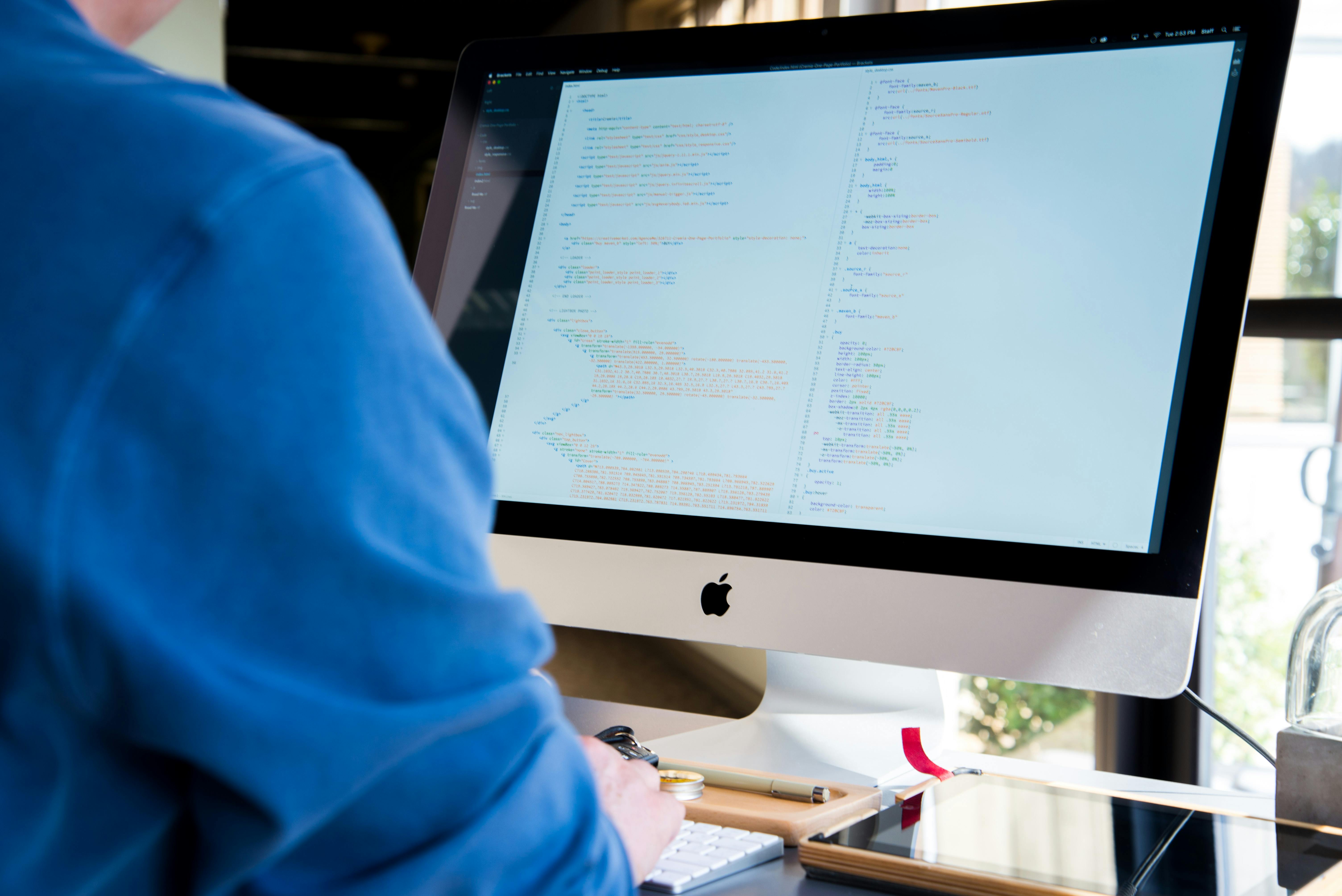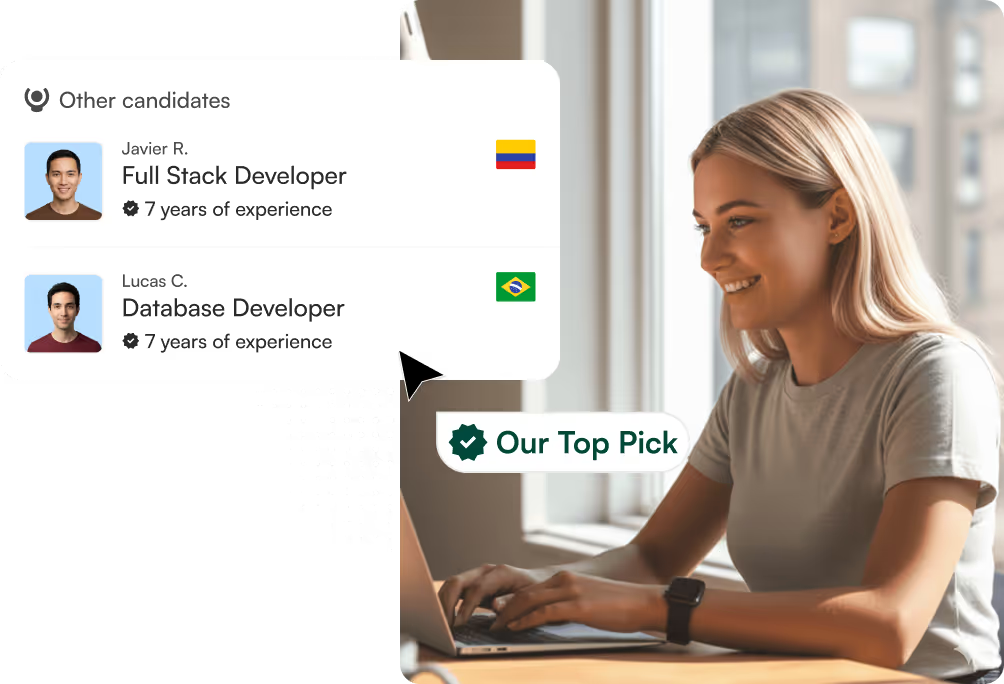What Is a Blockchain Developer, and How to Become One?


Lupa will help you hire top talent in Latin America.
Book a Free Consultation
Lupa helps you build, manage, and pay your remote team. We deliver pre-vetted candidates within a week!
Book a Free ConsultationBlockchain technology has emerged as one of the most revolutionary innovations of the 21st century, extending far beyond its initial cryptocurrency applications. As industries from finance and healthcare to supply chain and gaming embrace blockchain solutions, the demand for skilled blockchain developers continues to surge. With the global blockchain market size reaching $31.28 billion USD in 2024 and projected job growth of 17% from 2023 to 2033, blockchain development represents an exciting and lucrative career path for tech professionals.
Whether you're an aspiring developer looking to transition into blockchain, a computer science student exploring career options, or an experienced developer seeking to upskill, understanding what blockchain development entails is your first step toward success in this field. This article will guide you through the fundamentals of blockchain technology, the types of blockchain developers, essential skills required, learning paths, and career opportunities in this dynamic industry.
Understanding Blockchain Technology Fundamentals
At its core, blockchain technology is a decentralized, distributed ledger that records transactions across multiple computers. Unlike traditional centralized databases managed by a single authority, blockchain distributes identical copies of the ledger across a network of computers (nodes). This structure ensures transparency, security, and immutability of data.
The blockchain consists of blocks containing transaction data, with each block linked to the previous one through cryptographic hashes, forming a chain. This architecture makes the system highly resistant to modification, as altering any block would require changing all subsequent blocks across the entire network.
Key components of blockchain technology include:
- Blocks: Containers for batches of validated transactions
- Cryptography: Ensures security through public-key cryptography and hash functions
- Consensus mechanisms: Protocols that ensure all nodes agree on the state of the blockchain
- Distributed ledger: The shared database maintained across the network
Understanding these fundamentals is essential before diving into blockchain development, as they form the foundation upon which all blockchain applications are built.
Types of Blockchain Developers
The blockchain development field encompasses two primary categories of professionals, each with distinct responsibilities and skill requirements.
Core Blockchain Developers
Core blockchain developers focus on designing and building the underlying blockchain architecture and protocols. Their responsibilities include:
- Designing blockchain protocols and consensus mechanisms
- Developing the core architecture of blockchain networks
- Implementing security features and cryptographic elements
- Creating and maintaining the blockchain's backend infrastructure
- Optimizing network performance and scalability
These developers require deep knowledge of distributed systems, cryptography, network security, and low-level programming languages like C++, Rust, or Go. They work on fundamental infrastructure projects such as creating new blockchain platforms or improving existing protocols like Ethereum, Bitcoin, or Hyperledger.
Blockchain Software Developers
Blockchain software developers build applications that run on existing blockchain platforms. Their focus includes:
- Developing smart contracts that execute automatically when conditions are met
- Creating decentralized applications (DApps) with user-friendly interfaces
- Integrating blockchain functionality into existing software systems
- Building and maintaining the frontend and backend of blockchain applications
- Testing and deploying blockchain solutions
These developers typically work with languages like Solidity (for Ethereum smart contracts), JavaScript for frontend development, and Web3 libraries for blockchain integration. They might build DeFi platforms, NFT marketplaces, supply chain tracking systems, or other blockchain applications.
Essential Skills for Blockchain Developers
Becoming a successful blockchain developer requires a diverse skill set spanning programming languages, computer science fundamentals, blockchain-specific knowledge, and familiarity with development tools.
Programming Languages
Different blockchain platforms require different programming languages. The most important ones include:
- Solidity: The primary language for writing smart contracts on Ethereum
- JavaScript: Essential for frontend development and Web3 integration
- Python: Used for blockchain application development and analysis
- Rust: Preferred for high-performance blockchains like Solana
- C++: Used in core blockchain development, including Bitcoin
- Go: Utilized in enterprise blockchain frameworks like Hyperledger Fabric
As a blockchain developer, you should master at least one blockchain-specific language (like Solidity) and have proficiency in general-purpose languages like JavaScript or Python for building complete applications.
Computer Science Fundamentals
Strong computer science foundations are crucial for blockchain development:
- Data structures: Particularly Merkle trees, which are fundamental to blockchain architecture
- Algorithms: Understanding of sorting, searching, and optimization algorithms
- Cryptography: Knowledge of hash functions, public-key cryptography, and digital signatures
- Distributed systems: Concepts of consensus, fault tolerance, and network synchronization
These fundamentals help blockchain developers understand the underlying principles of blockchain technology and design secure, efficient systems.
Blockchain-Specific Knowledge
Beyond general programming and computer science skills, blockchain developers need specialized knowledge:
- Smart contracts: Self-executing contracts with terms written in code
- Consensus mechanisms: Understanding of Proof of Work (PoW), Proof of Stake (PoS), and other validation methods
- Tokenomics: The economic systems governing cryptocurrency tokens
- Gas optimization: Techniques to minimize transaction costs on blockchains like Ethereum
- Blockchain architectures: Knowledge of public, private, consortium, and hybrid blockchain models
This specialized knowledge enables developers to create effective blockchain solutions tailored to specific use cases and platforms.
Development Tools and Frameworks
Blockchain developers use various tools and frameworks to streamline development:
- Development environments: Truffle, Hardhat, and Ethereum Remix for smart contract development
- Libraries: Web3.js, Ethers.js, and Web3.py for blockchain interaction
- Testing frameworks: Mocha, Chai, and Waffle for testing smart contracts
- Infrastructure tools: IPFS for decentralized storage, Infura for blockchain access
- Version control: GitHub for code management and collaboration
Proficiency with these tools accelerates development and helps ensure the quality and security of blockchain applications.
Learning Path for Aspiring Blockchain Developers
Becoming a blockchain developer requires a structured approach to learning. Here's a step-by-step roadmap to guide your journey.
Step 1: Master Programming Fundamentals
Before diving into blockchain-specific technologies, establish a solid foundation in programming:
- Start with a general-purpose language like JavaScript or Python
- Learn object-oriented programming concepts
- Practice building simple applications to reinforce your skills
- Understand web development basics, including HTML, CSS, and APIs
Resources like freeCodeCamp, Codecademy, and The Odin Project offer comprehensive courses for beginners. Once comfortable with general programming, you can transition to blockchain-specific languages like Solidity.
Step 2: Learn Blockchain Basics
Develop a theoretical understanding of blockchain technology:
- Study the history and evolution of blockchain
- Explore different blockchain platforms (Ethereum, Bitcoin, Solana, Hyperledger)
- Understand the technical aspects of how blockchains work
- Familiarize yourself with cryptocurrency concepts and tokenomics
Resources like Coursera's "Blockchain Specialization," MIT OpenCourseWare, and the official documentation of major blockchain platforms provide excellent starting points for learning blockchain fundamentals.
Step 3: Develop Smart Contract Skills
Focus on learning smart contract development:
- Master Solidity for Ethereum-based projects
- Understand smart contract security best practices
- Learn to write, test, and deploy smart contracts
- Practice with simple projects like token creation or voting systems
Platforms like CryptoZombies, Remix IDE, and Ethereum's official documentation offer interactive tutorials for learning smart contract development. Start with simple contracts before progressing to more complex applications.
Step 4: Build Full-Stack DApps
Combine your frontend and blockchain skills to create complete decentralized applications:
- Learn to connect user interfaces to smart contracts using Web3 libraries
- Develop responsive frontends that interact with blockchain backends
- Understand user authentication in decentralized systems
- Build portfolio projects that showcase both technical skills and blockchain understanding
Creating projects like decentralized marketplaces, voting applications, or simple DeFi tools will help you apply your knowledge and build a portfolio.
Step 5: Engage with the Blockchain Community
Immerse yourself in the blockchain ecosystem:
- Contribute to open-source blockchain projects
- Participate in hackathons and coding challenges
- Join blockchain developer communities on Discord, Reddit, or Telegram
- Attend virtual or in-person blockchain conferences and meetups
Community involvement provides learning opportunities, mentorship, and potential job connections. Platforms like Gitcoin, DevPost, and ETHGlobal host regular hackathons where you can apply your skills and network with other developers.
Blockchain Career Opportunities and Outlook
The blockchain industry offers diverse career paths with strong growth potential and competitive compensation.
Job Roles and Responsibilities
Beyond the core and software developer roles, the blockchain ecosystem offers various specialized positions:
- Blockchain Architect: Designs comprehensive blockchain solutions for enterprises
- Smart Contract Auditor: Reviews smart contracts for security vulnerabilities
- Blockchain Security Specialist: Focuses on securing blockchain networks and applications
- Blockchain Project Manager: Coordinates blockchain development teams and projects
- Blockchain Consultant: Advises companies on blockchain implementation strategies
Each role requires different combinations of technical skills, business knowledge, and industry expertise. Many professionals start as general blockchain developers before specializing in specific areas based on their interests and strengths.
Industry Demand and Salary Expectations
The demand for blockchain developers continues to grow across industries:
- Job growth for blockchain developers is projected at 17% from 2023 to 2033
- The average salary for blockchain developers in the US is approximately $147,000 per year, according to Glassdoor.
- Experienced blockchain developers at major tech companies or financial institutions can earn $200,000+ annually
- Remote work opportunities are abundant, allowing for global employment options
Salaries vary by location, experience level, and industry, with finance and tech companies typically offering the highest compensation. The IT salary guide provides more detailed information about compensation in the tech industry, including blockchain roles.
Emerging Fields in Blockchain Development
Several cutting-edge areas within blockchain offer exciting career opportunities:
- DeFi (Decentralized Finance): Building financial applications without traditional intermediaries
- NFTs (Non-Fungible Tokens): Developing platforms for creating, buying, and selling unique digital assets
- Metaverse Integration: Connecting blockchain technology with virtual reality environments
- Layer-2 Scaling Solutions: Creating systems that improve blockchain transaction speed and efficiency
- Enterprise Blockchain Applications: Developing private blockchain solutions for corporate use
These emerging fields represent growth areas within blockchain development, each requiring specialized knowledge and offering unique career paths. Staying informed about these trends can help you position yourself for opportunities in high-demand niches.
Educational Resources and Certifications
Multiple pathways exist for learning blockchain development, from formal education to self-directed learning.
Online Courses and Specializations
Several reputable platforms offer comprehensive blockchain development courses:
- Coursera: Blockchain Specialization by the University at Buffalo, Blockchain Revolution Specialization
- Udemy: Ethereum and Solidity: The Complete Developer's Guide, Blockchain A-Z
- edX: Blockchain Fundamentals, Blockchain for Business
- ConsenSys Academy: Blockchain Developer Program
- B9lab: Certified Ethereum Developer Course
These courses range from beginner to advanced levels and often include hands-on projects to reinforce learning. Many offer certificates upon completion, which can enhance your resume.
Certifications and Their Value
Industry certifications can validate your blockchain development skills:
- Certified Blockchain Developer (CBD) by the Blockchain Council
- Certified Blockchain Solution Architect (CBSA) by the Blockchain Training Alliance
- Certified Ethereum Developer by the Ethereum Certification Program
While certifications aren't always required for employment, they can demonstrate your commitment to the field and validate your knowledge, particularly for those without formal computer science backgrounds. Employers generally value practical experience and portfolio projects more highly than certifications alone.
Self-Learning Resources
For self-directed learners, numerous free and low-cost resources are available:
- Documentation: Official guides from Ethereum, Solana, and other blockchain platforms
- GitHub repositories: Open-source projects with code examples and tutorials
- YouTube channels: Channels like Dapp University, Eat the Blocks, and Finematics
- Books: "Mastering Ethereum," "Mastering Bitcoin," and "Token Economy"
- Blogs and forums: Ethereum Research, r/ethdev, and Medium blockchain publications
Self-learning requires discipline but offers flexibility and can be combined with structured courses for a comprehensive education. Building projects while learning helps reinforce concepts and creates portfolio pieces for job applications.
Conclusion
Becoming a blockchain developer requires a combination of programming skills, computer science fundamentals, blockchain-specific knowledge, and continuous learning. The field offers exciting opportunities to work on cutting-edge technology with significant potential to transform industries worldwide.
The journey to becoming a blockchain developer may seem challenging, but with a structured approach to learning and consistent practice, it's achievable for motivated individuals. Start by building a strong foundation in programming, gradually add blockchain-specific skills, and engage with the community to accelerate your growth.
As blockchain technology continues to evolve and gain adoption, skilled blockchain developers will remain in high demand. Whether you're drawn to the technical challenges, the innovative applications, or the competitive compensation, blockchain development offers a rewarding career path for those willing to invest in developing the necessary skills.
Ready to Build Your Tech Team with Premium Talent?
Looking to hire blockchain developers or other tech professionals for your team? At Lupa, we connect companies with Latin America's top-tier professionals through a quality-first approach that prioritizes match quality over speed. Our strategic recruiting process is designed for high-bar teams who value finding the right blockchain developer with the perfect combination of technical skills and cultural fit.
Unlike traditional recruiting services that rush the process, we take a consultative approach to understand your specific blockchain development needs and find professionals who truly align with your company's vision and technical requirements. Our deep understanding of the LatAm tech ecosystem gives you access to premium talent with expertise in blockchain technology, smart contracts, and decentralized applications.
Book a discovery call today to learn how we can help you build your dream blockchain development team with confidence.

"Over the course of 2024, we successfully hired 9 exceptional team members through Lupa, spanning mid-level to senior roles. The quality of talent has been outstanding, and we’ve been able to achieve payroll cost savings while bringing great professionals onto our team. We're very happy with the consultation and attention they've provided us."


“We needed to scale a new team quickly - with top talent. Lupa helped us build a great process, delivered great candidates quickly, and had impeccable service”


“With Lupa, we rebuilt our entire tech team in less than a month. We’re spending half as much on talent. Ten out of ten”






















